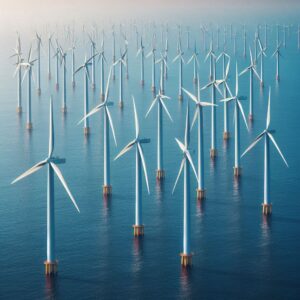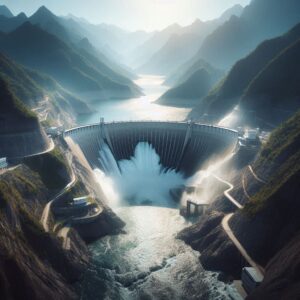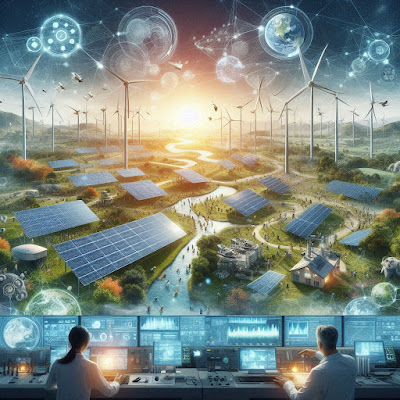Green Energy:- What is Green Energy?
Green energy, Which is also known as renewable or sustainable energy, refers to power generated from natural sources that are replenished constantly and do not produce harmful emissions and ingredients like toxic gases, air pollution etc. These sources Soursec of green energy include solar, wind, hydropower, geothermal, and biomass energy. The main potential of green energy stands in its ability to meet energy demands without the environmental degradation or Damages caused by traditional fossil fuels like coal, oil, and natural gas.
 |
| Green Energy System |
Types of Green Energy:
Solar Energy
Solar power Produces energy from the sun’s rays using photovoltaic (PV) panels or solar thermal collectors. Photovoltaic panels convert sunlight directly into electric Power of Electricity, And thermal collectors use sunlight to heat water or air for various applications. Solar energy is abundant and accessible in most parts of the world, making it a leading source of green energy. Unlike fossil fuels, solar energy produces no air pollution or greenhouse gases during operation. it is Efficiently and in Huge Quantities being Produced by All the Countries,
Wind Energy
Wind energy is Produced by wind turbines, which convert the kinetic energy of moving air into electricity or Electric Power. Wind farms with multiple turbines are often Situated and Established in windy areas such as coastal regions or open plains. Wind power Energy System is one of the fastest-growing renewable energy technologies, offering a clean alternative to fossil fuels. Wind turbines do not emit pollutants, although their installation can impact wildlife and require land use planning. The Setups of Wind Energy Can Easily be Constructed and Established without or with Minimal Effect on Nature.
 |
| Wind Energy System |
Hydropower Energy
Hydropower System generates electricity by using the movement of water through dams, rivers, or tidal systems. It is one of the oldest and most established renewable energy sources. Hydropower stations can generate a steady and reliable electricity source by harnessing and Converting the kinetic energy of flowing water. However, the construction of large dams can have ecological and social impacts, including the displacement of communities and disruption of aquatic ecosystems.
 |
| Hydropower Generation System |
Geothermal Energy
Geothermal energy exploits the heat stored Under the Earth’s surface. In areas where the Earth’s crust thickness is less, such as near tectonic plate boundaries or volcanic regions, geothermal energy can be used to generate electricity or heat directly for buildings. This energy source is highly reliable and produces minimal emissions, but its availability is geographically limited to certain regions.
 |
| Geothermal Power Generation System |
Biomass Energy
Biomass energy is derived from organic materials like wood, crop waste, and animal manure and waste Products. Through processes like combustion or anaerobic digestion, biomass can be used to generate heat, electricity, or even biofuels. Although biomass is renewable, its sustainability depends on proper resource management. If harvested unsustainably, biomass can contribute to deforestation and air pollution.
 |
| Biomass Energy System |
Advantages of Green Energy
The Main and primary advantage of green energy is its minimal environmental impact. Just like fossil fuels, which release significant amounts of carbon dioxide (CO2) and other pollutants, green energy sources emit little to no greenhouse gases. This reduction in emissions helps combat climate change, one of the most Dangerous global challenges today.
Moreover, green energy is renewable, meaning it is not subject to depletion and it is not going to Exhaust or end. As long as the sun shines, the wind blows, and rivers flow, these energy sources can be Utilised and Used indefinitely. This contrasts And Concepts sharply with finite fossil fuels, which are expected to run out in the coming decades.
Green energy also promotes energy independence. Countries that invest in renewable energy infrastructure can reduce their reliance and Dependency on imported fossil fuels, enhancing their energy security and economic growth as well as stability.
Challenges of Green Energy
After All Green Energy has many benefits, green energy faces many uncertain challenges as well. One of the most Important Factors is the intermittent nature of some renewable sources, like solar and wind, which are totally dependent on weather conditions. Energy storage technologies, such as Power batteries, are crucial for addressing this issue but still, these are being developed and Technologies are Being Enhanced to scale Up.
Further, the upfront costs for green energy installations can be higher than other and conventional energy sources. After all, these costs of Green Energy Power Generation Systems have been declining rapidly for a Long Time Ago as technologies improve and economies of scale are achieved.
Conclusion
Green energy represents a vital step towards a sustainable future for the World Power Generation System. By reducing greenhouse gas emissions, promoting energy & Power independence, and leveraging abundant natural resources, it holds the potential to transform the global energy landscape. While there are challenges to overcome, continued investment and innovation in renewable energy technologies can help create a cleaner, healthier planet for future generations.
For More Post Click here

